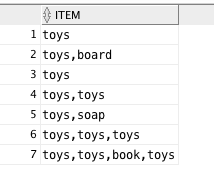Hi Folks,
I have a column in table which has data like this.

So, my requirement is just to return rows which having string only as 'toys' in this comma separated value.
ie.in my output should be something like this..
toys
toys
toys,toys
toys,toys,toys
Is it possible to achieve it in a where condition directly.Any regex is available to check this condition.
select item
from table
where (...condition...) = 'toys';
Please help on this problem.
Thank You.